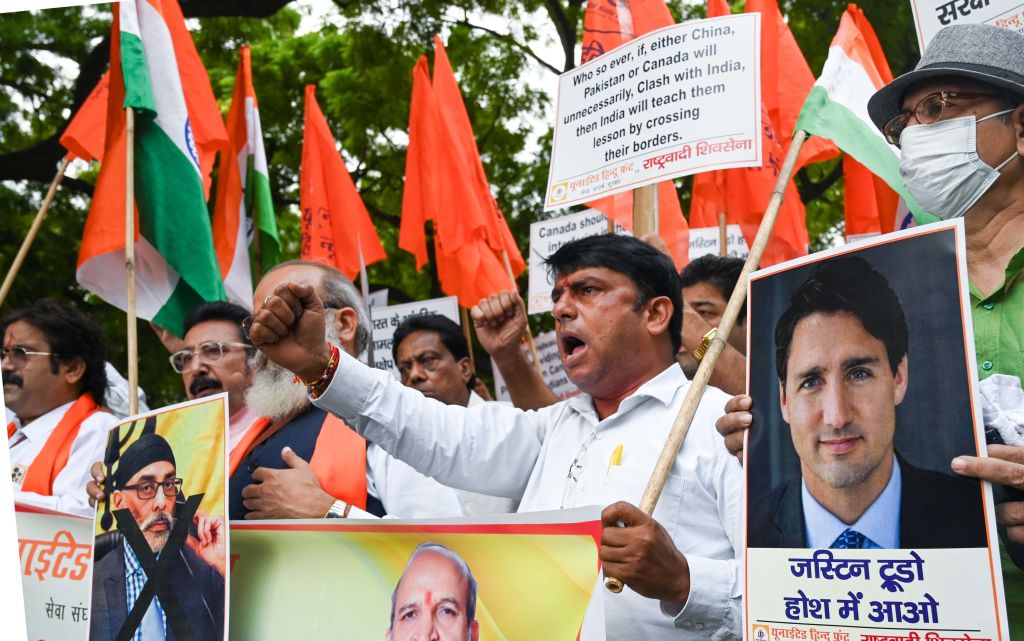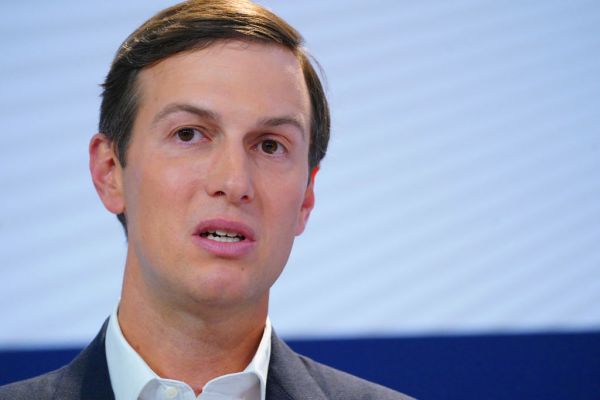Happy Friday! When holders of that coveted Costco membership card claimed the wholesaler was the gold standard of grocery stores, we didn’t know we were supposed to take them literally.
Quick Hits: Today’s Top Stories
- Iranian Revolutionary Guard vessels aimed lasers at the cockpit of a U.S. attack helicopter while it was operating in international airspace over the Persian Gulf on Wednesday, a U.S. Navy spokesman said Thursday, calling the behavior “unsafe, unprofessional and irresponsible.” No one was injured in the incident and the helicopter was not damaged.
- NATO General-Secretary Jens Stoltenberg made a previously unannounced visit to Kyiv, Ukraine, Thursday, noting in a joint press conference with Ukrainian President Volodymyr Zelensky that Ukrainian troops were “gradually gaining ground” in their ongoing counteroffensive against Russian troops. The visit came after Ukrainian air defense systems in the south of the country reportedly destroyed 30 drones in an overnight Russian barrage Wednesday.
- President Joe Biden delivered a speech in Arizona yesterday calling former President Donald Trump and his “extremist movement” a danger to democracy. “There’s something dangerous happening in America right now,” Biden said. “They’re pushing the notion that the defeated former president expressed when he was in office and believes applies only to him.” The president also paid tribute to the late Sen. John McCain, announcing plans to construct a library in his honor at Arizona State University.
- The House Oversight Committee held its first hearing in its impeachment inquiry investigating potential misconduct and corruption by President Biden on Thursday. Three Republican-picked witnesses testified before the committee, though two said the GOP did not yet have enough evidence to support claims of corruption by the Biden family—a sentiment echoed by a fourth, Democrat-selected witness. GOP witness Eileen O’Connor, former assistant attorney general for the Justice Department’s Tax Division, testified that, based on documents obtained by the House Ways and Means Committee and released Wednesday, the prosecutor overseeing the probe into Hunter Biden’s taxes may have attempted to shield the elder Biden from Justice Department scrutiny.
- The Senate on Thursday opened debate on a bipartisan continuing resolution—a stopgap spending bill that would keep the government funded through mid-November—though the measure, which McCarthy swiftly rejected, will be dead on arrival in the Republican-controlled House. Meanwhile, in a late-night vote series, the House passed funding bills for the State Department, the Department of Defense, and the Department of Homeland Security—though the bills represent just a starting point in negotiations with the Senate. House lawmakers failed to pass appropriations bills for the Department of Agriculture and the Food and Drug Administration.
- A five-judge panel on the New York state appeals court on Thursday denied Trump’s request to postpone his trial on business fraud allegations. The trial will begin on Monday where New York Attorney General Letitia James will present her case, arguing the former president inflated the value of his properties and other assets by hundreds of millions of dollars in order to receive better loan terms and lower insurance premiums.
- Michael Gambon, the Irish-born film and stage actor who played Albus Dumbledore in the Harry Potter film franchise, died Wednesday after suffering a “bout of pneumonia,” according to his publicist. Gambon was 82 years old.
An Indo-Canadian Dust-Up

At the Group of 20 summit in India earlier this month, Indian Prime Minister Narendra Modi called for reinvigorated trust in—and between—governments. “As the President of the G20, India invites the entire world to come together and, first and foremost, transform this global trust deficit into global trust and confidence,” he said.
Just over a week later, Canadian Prime Minister Justin Trudeau took to the floor of his country’s parliament to accuse Modi’s government of involvement in the June assassination of a Sikh nationalist—and Canadian citizen—on Canadian soil.
The shocking allegation has brought relations between two Commonwealth democracies in New Delhi and Ottawa to an all-time low. The details surrounding Trudeau’s claims remain murky, but the escalating tensions may nonetheless have repercussions for the complex relationship President Joe Biden is trying to build with the South Asian nation positioned as a potential bulwark against their common rival in China.
The high from the G20 meeting that positioned India as an ascendant world power didn’t last long. “Over the past number of weeks, Canadian security agencies have been actively pursuing credible allegations of a potential link between agents of the government of India and the killing of a Canadian citizen, Hardeep Singh Nijjar,” Trudeau told members of parliament last Monday, visibly angry. “Last week at the G20, I brought [the allegations] personally and directly to Prime Minister Modi in no uncertain terms.” Biden and other leaders from the “Five Eyes” alliance—an agreement that allows Canada, the United States, the United Kingdom, Australia and New Zealand to share a broad range of classified intelligence—reportedly also privately broached the topic with Modi at the G20.
Nijjar, an Indian-born Canadian citizen, was shot and killed in June outside the Vancouver-area Sikh temple of which he was president. The Washington Post reviewed security footage from the day of the killing, which shows a multipronged operation to trap Nijjar in the parking lot of his temple. Two hooded assailants—assisted by the driver of a sedan who blocked Nijjar’s pickup truck—fired roughly 50 bullets, 34 of which struck Nijjar. Canadian investigators have not yet apprehended the shooters or their potential accomplices.
In a country that has the largest Sikh population outside of India, Nijjar wasn’t just any temple leader. He was active in the Khalistan movement, agitating for a Canadian referendum to support an independent Sikh homeland in the Indian state of Punjab. The separatist movement has a violent history in India, which reached its height in the 1980s when two Sikh bodyguards assassinated Indian Prime Minister Indira Gandhi after she allowed the storming of the Sikhs’ holiest temple in the Punjab. While the calls for an independent Sikh state have mostly died down in India, they live on in the Sikh diaspora.
The Indian government has long claimed Nijjar was a militant—it said he was behind a bombing of a theater in Punjab, which he denied, and in 2020, it designated him as a terrorist. Indian officials also connected him to an alleged attack on a Hindu priest and were seeking his arrest.
India’s ministry of external affairs vehemently denied any involvement in Nijjar’s death, calling the allegations “absurd and motivated,” and accused Canada of harboring terrorists acting against India. Ministry officials have also suggested the accusation was an effort to drum up political support in the Indian Sikh diaspora community, roughly 2 percent of Canada’s population which largely backs Trudeau’s liberal party.
The Khalistan issue has long been a sticky one for India and Canada. India has often claimed Canada is too sympathetic to Sikh separatists. But if things had chugged along alright before, despite their differences, Trudeau’s claims kicked off a diplomatic doom spiral. Canada expelled a top Indian diplomat, which India reciprocated with a Canadian envoy. Ottawa tabled a new trade agreement between the countries, originally set to be negotiated at a meeting in October. Both countries have issued dueling travel warnings for their citizens. In a dramatic move Thursday, India suspended its visa program for Canadians wishing to travel to India and asked Ottawa to downsize its diplomatic presence in India.
“[Canada] announced, with a lot of fanfare, an Indo-Pacific strategy last year,” Ian Bremmer, founder and president of the political risk analysis firm Eurasia Group, tells TMD. “The ‘Indo’ part is basically D.O.A., right? So it is a problem, and I don’t see a near-term resolution.”
If the allegations of Indian involvement in the killing are true, they would represent a stark break in typical conduct between two democracies and a dramatic breach of Canada’s sovereignty. “The Indians absolutely have reason to be angry about the Canadians inadequately responding to their concerns about radicalism and promotion of terror,” Bremmer says. “But there are legal channels that two democracies use to work that through.”
Few concrete details have emerged about the nature of the intelligence that led to Trudeau’s dramatic statement on the floor of the House of Commons. Canadian security services themselves reportedly gathered the “smoking gun” evidence—surveillance of conversations between Indian diplomats in Canada—linking New Delhi with the murder. But U.S. Ambassador to Canada David Cohen said Sunday that intelligence shared through the Five Eyes network helped Canadian officials draw their ultimate conclusion about Indian involvement, though he refused to say whether that intelligence had originated with the United States. The New York Times on Monday, quoting anonymous “allied officials,” reported that U.S. officials provided the Canadian government with contextual intelligence after the killing, but officials added the U.S. didn’t have advance warning about the hit or the perpetrators. India has said it has not seen evidence of Canada’s claims.
The rift between the U.S. neighbor to the North and its burgeoning strategic partner in the Indo-Pacific could put the Biden administration in a tight diplomatic spot. Biden officials have insisted on the importance of Canada’s investigation. “From our perspective, it is critical that the Canadian investigation proceed, and it would be important that India work with the Canadians on this investigation,” Secretary of State Antony Blinken said Friday. “We want to see accountability, and it’s important that the investigation run its course and lead to that result.”
Seemingly mindful of other countries’ attempts to off dissidents from a distance—as Russia has done repeatedly over the last two decades and beyond, and which Iran has attempted to do in the U.S. on several occasions—Blinken and National Security Adviser Jake Sullivan struck a more forceful tone on what Blinken called “transnational repression” by foreign governments.
“It is a matter of concern for us. It is something we take seriously. It is something we will keep working on, and we will do that regardless of the country,” Sullivan told reporters at the White House Thursday. “There’s not some special exemption you get for actions like this. Regardless of the country, we will stand up and defend our basic principles.”
Progress in the Middle East
The Dispatch’s Charlotte Lawson visited the West Bank this week to check in on an important part of the ongoing Saudi-Israeli diplomatic talks: the Palestinians. Here’s an excerpt from her story.
RAMALLAH, West Bank—A major milestone this week marked Saudi Arabia and Israel’s continuing talks to normalize their diplomatic relations, which in itself would be an historic achievement. Israeli Tourism Minister Haim Katz arrived in Saudi Arabia on Tuesday to attend a United Nations-hosted tourism conference, the first public trip by any senior Israeli official to the kingdom.
But a different trip that received much less fanfare demonstrated Saudi Arabia’s approach to addressing a perennial challenge in the region. For the first time in more than 50 years, a Saudi delegation visited the West Bank Tuesday to meet with top Palestinian officials. The Saudis’ renewed outreach—a move in service to their reputation as the global leader of Islam—suggests the kingdom is trying to secure concessions for the Palestinians as part of its own peace with Israel. But the deteriorating legitimacy of Palestinian leadership, both among its own people and in the entire region, could stand in the way.
In the West Bank city of Ramallah, the administrative capital of the PA, animosity toward 87-year-old President Mahmoud Abbas has stewed for decades. He recently entered the 18th year of what was supposed to be a four-year term, boasting a long track record of consolidating executive power and canceling elections. Discontent with his autocratic rule runs deep, even among members of his own Fatah party, raising the specter of a Palestinian civil war before or after his death.
“President Abbas is very weak, very unpopular, very corrupt, and doesn’t have the legitimacy of being a president,” Dimitri Diliani, spokesperson of Fatah’s Democratic Reformist faction, says in an interview from his home in Jerusalem. “Abbas is not Palestine. Palestine rejects Abbas,” Diliani adds. “So if Saudi Arabia focuses on Palestine and ditches Abbas, it would go far with the Palestinian people.”
But PA officials may see the Saudi-Israeli talks as an opportunity to line their own pockets, given that the Saudis’ outreach is likely to take the form of cash infusions into the moribund Palestinian economy.
The Arab state, once a major financial backer of the Palestinians, began cutting off aid to the PA in 2016 and dropped its support entirely by 2021 after it accused the group of corruption and inefficiency. But in August, it reportedly extended an offer to resume aid as part of its behind-the-scenes talks with Israel. The Saudis are likely hoping that restarting the cashflow will soften Palestinian backlash to any eventual agreement, particularly given Abbas’ outraged response to the United Arab Emirates’ normalization with Israel in 2020. That agreement, brokered by the Trump administration, began a cascade of peace deals between Israel and countries across the region.
Worth Your Time
- In the spring of last year, three 20-somethings—living with 13 other people in a four-bedroom New York City “hacker” flophouse—created a Google listing for a fictional steakhouse. They named their imaginary restaurant after Mehran Jalali, one of the roommates who had a knack for cooking top sirloin. “Mehran’s Steak House has a near-perfect Google rating, with 91 glowing reviews: ‘Best steak I have ever had in NY,’ ‘Words cannot explain how phenomenal the steak was’ and ‘Chef Mehran is a genius-god among men,’” Becky Hughes writes for the New York Times. “A week after the listing was posted in March 2022, Mr. Jalali, now 21, said, ‘A couple walked in like, ‘We’re here for the steak.’ The roommates turned them away, but their listed phone number rang off the hook.” After a local newsletter writer (not one of your TMD editors) started poking around in May of this year, the friends—now living on the West Coast—decided to make the joke real for just one night. “On Saturday afternoon, as Tropical Storm Ophelia drenched the city, Mr. Jalali and his ‘staff’ (60 of his, Riley Walz’s and Danielle Egan’s friends, mostly college students and tech dropouts, invited to fly in for the event) prepared for dinner service. Almost none of the volunteers had any cooking experience, and were randomly assigned prep work by Mr. Walz and Mr. Jalali. As Anson Yu, a pescatarian, patted dry 114 pounds of rib-eyes, Mr. Jalali asked the team, ‘Do the steaks get seasoned before or after the sear?’ Joe Skorupski, 30, added his name to Mehran’s waiting list in January. ‘It was artsy,’ Mr. Skorupski said, likening it to a cross between a steakhouse and MoMA. ‘This is a place that’s going to blow up.’”
Presented Without Comment
Washington Post: Teen arrested after felling of famous Sycamore Gap tree on Hadrian’s Wall
Also Presented Without Comment
The Philadelphia Inquirer: John Fetterman says he’ll suit up as Senate unanimously adopts formal dress code
Toeing the Company Line
- In the newsletters: Nick argues (🔒) that the GOP debate—during which old-school conservatives were some of the loudest voices—belies the populist reality of today’s Republican Party.
- On the podcasts: Steve and Jonah are joined on The Dispatch Podcast by special guest Yuval Levin to discuss the second GOP debate and the looming government shutdown.
- On the site today: Brian Riedl unpacks Republicans’ shutdown theater and Brent Orrell reviews “The Overlooked Americans: The Resilience of Our Rural Towns and What It Means for Our Country.”
Let Us Know
How should the U.S. respond if India was definitely involved in Nijjar’s assassination?










Please note that we at The Dispatch hold ourselves, our work, and our commenters to a higher standard than other places on the internet. We welcome comments that foster genuine debate or discussion—including comments critical of us or our work—but responses that include ad hominem attacks on fellow Dispatch members or are intended to stoke fear and anger may be moderated.
You are currently using a limited time guest pass and do not have access to commenting. Consider subscribing to join the conversation.
With your membership, you only have the ability to comment on The Morning Dispatch articles. Consider upgrading to join the conversation everywhere.